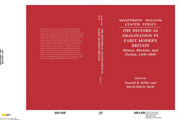Book contents
- Frontmatter
- Contents
- Preface
- WOODROW WILSON CENTER SERIES
- 1 Introduction
- 2 Precept, example, and truth: Degory Wheare and the ars historica
- 3 Truth, lies, and fiction in sixteenth-century Protestant historiography
- 4 Thomas More and the English Renaissance: History and fiction in Utopia
- 5 Little Crosby and the horizons of early modern historical culture
- 6 Murder in Faversham: Holinshed's impertinent history
- 7 Foul, his wife, the mayor, and Foul's mare: The power of anecdote in Tudor historiography
- 8 Experience, truth, and natural history in early English gardening books
- 9 Thomas Hobbes's Machiavellian moments
- 10 The background of Hobbes's Behemoth
- 11 Leviathan, mythic history, and national historiography
- 12 Protesting fiction, constructing history
- 13 Adam Smith and the history of private life: Social and sentimental narratives in eighteenth-century historiography
- 14 Contemplative heroes and Gibbon's historical imagination
- Contributors
- Index
- Titles in the series
4 - Thomas More and the English Renaissance: History and fiction in Utopia
Published online by Cambridge University Press: 04 August 2010
- Frontmatter
- Contents
- Preface
- WOODROW WILSON CENTER SERIES
- 1 Introduction
- 2 Precept, example, and truth: Degory Wheare and the ars historica
- 3 Truth, lies, and fiction in sixteenth-century Protestant historiography
- 4 Thomas More and the English Renaissance: History and fiction in Utopia
- 5 Little Crosby and the horizons of early modern historical culture
- 6 Murder in Faversham: Holinshed's impertinent history
- 7 Foul, his wife, the mayor, and Foul's mare: The power of anecdote in Tudor historiography
- 8 Experience, truth, and natural history in early English gardening books
- 9 Thomas Hobbes's Machiavellian moments
- 10 The background of Hobbes's Behemoth
- 11 Leviathan, mythic history, and national historiography
- 12 Protesting fiction, constructing history
- 13 Adam Smith and the history of private life: Social and sentimental narratives in eighteenth-century historiography
- 14 Contemplative heroes and Gibbon's historical imagination
- Contributors
- Index
- Titles in the series
Summary
One of the more elusive questions in charting the history of the modern historical consciousness is to ask when and how history tried to separate itself from fiction. Perhaps the trouble arises because the distinction between the two is so fundamental and yet so problematical, so full of difficulty, that there are some in our own contemporary culture who would deny it altogether. Indeed, for the modern skeptic there are many arguments to collapse the discrepancy between knowing and inventing the past, between discovering what actually happened and making it up, and it has recently become harder to defend the traditional distinctions between objective and subjective description, fact and value, truth and poetry. Doubt has spread even among historians. The one thing that seems reasonably clear is that there was once a time during the Middle Ages when no one seemed much concerned about the problem, and that it was only later, beginning with the Renaissance, that it began to arise. I have written elsewhere about the peculiar role that humanism seems to have played in generating the early modern conceptions of history and fiction; here I should like to return to the subject by having another look at that most fascinating of all texts in the early English Renaissance: Thomas More's Utopia. Whatever else More may have meant to do in that controversial work, he was certainly preoccupied there with the relationship between the real and the ideal in human life, and thus, inescapably, with the distinction between history and fiction.
- Type
- Chapter
- Information
- The Historical Imagination in Early Modern BritainHistory, Rhetoric, and Fiction, 1500–1800, pp. 69 - 92Publisher: Cambridge University PressPrint publication year: 1997
- 1
- Cited by

